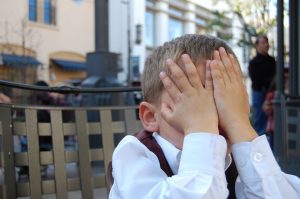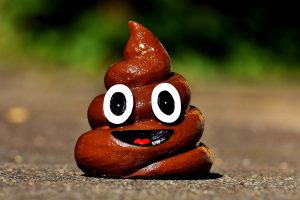
Does your child have problems with pooping accidents? Is your child old enough to know better than to soil their underwear? Your child most likely has encopresis.
What Is Encopresis?
Encopresis is the medical term for pooping accidents in a person's underwear beyond the age of toilet training. These stooling accidents often make parents frustrated because they think their child is being too lazy to use the toilet or is having the pooping accidents because they are misbehaving.
What Causes Encopresis?
Most cases of encopresis are due to
constipation. Encopresis occurs because excess stool is being retained in the large intestine or colon. As excess stool accumulates in the last part of the colon, referred to as the rectum, the stool becomes large and hard and extremely difficult for the child to pass. Liquid stool starts to seep around the hard stool and passes into the underwear. The child is usually unaware that an accident has occurred because the rectum has become too stretched with hard stool. A visual representation of the process is shown in
this informative video. Many parents think their child is having problems with
diarrhea when they see the constant liquid accidents in the underwear and do not realize that their child is, in fact,
constipated.
Does Behavior Play a Role in Pooping Accidents?
Most children are embarrassed when they have an accident. They often try to hide their underwear. Other children become anxious, withdrawn, or depressed, especially if they are being teased. A parent's natural reaction can be to punish the child, but this usually makes the situation worse. Many children have become so constipated with a dilated rectum full of stool that they are unable to feel the accident occurring. Once parents can understand the physiologic mechanism behind encopresis, they are able to help their child overcome these accidents.
How is Encopresis Treated?
How encopresis is treated involves three basic steps.
- The Clean Out
Before any long-term progress can be made, the child must be cleaned out. The clean out involves medication to evacuate all the stool from the large intestine or colon. There are several medications in the form of powders, liquids, pills, enemas, and suppositories that can be used to break up the stool so it is able to be passed as large quantities of diarrhea. The best clean out regimen for your child should be discussed with your child's physician.
- Maintenance Therapy

Once your child is cleaned out, the goal is to achieve 1-2 soft pudding-like consistency stools daily with no accidents. Initially, many of the same medicines used for the clean out will be used in lower doses for maintenance therapy. The goal of maintenance therapy is to prevent stool from accumulating so the large intestine and rectum can return to normal size and function over time.
During the maintenance therapy phase, it is important to work with your child on their diet with an emphasis on daily
water and
fiber goals.
Having fixed toilet times after breakfast and dinner will help "re-train" your child and emphasize the importance of listening to their body. During this time, no books or games are allowed because they are a distraction. Place your child's feet on a stool or a
Squatty Potty so their knees are elevated above their hips to allow easier passage of stool from the rectum.
The key to success in the maintenance phase is consistency, consistency, consistency. Be patient. Every child will make progress at a different rate. Once your child is achieving normal bowel movements, then a plan for weaning and then stopping medications will be determined by your child's physician.
- Counseling
Most children will achieve success after being cleaned out and started on maintenance therapy. However, some children have learned to control their bowel movements and will be very resistant to any change. Other children have emotional or behavioral challenges that interfere with achieving success. Speak to your child's physician about meeting with a
play therapist or counselor to help with issues such as family stressors, peer conflicts, academic difficulties, and low self-esteem, which may all be contributing to
constipation and encopresis.
Remember, overcoming encopresis is achievable. If your child is having pooping accidents, then do not assume they will just outgrow the problem with time. Speak to your child's doctor so your child can become accident free.
If you would like more information about
constipation or
gastrointestinal (GI) digestive disorders and nutrition in children, please contact Dr. Mona Dave's
Frisco Office or
Request Appointment Here.
SaveSave


 Does your child have problems with pooping accidents? Is your child old enough to know better than to soil their underwear? Your child most likely has encopresis.
Does your child have problems with pooping accidents? Is your child old enough to know better than to soil their underwear? Your child most likely has encopresis.
 Once your child is cleaned out, the goal is to achieve 1-2 soft pudding-like consistency stools daily with no accidents. Initially, many of the same medicines used for the clean out will be used in lower doses for maintenance therapy. The goal of maintenance therapy is to prevent stool from accumulating so the large intestine and rectum can return to normal size and function over time.
During the maintenance therapy phase, it is important to work with your child on their diet with an emphasis on daily water and fiber goals.
Having fixed toilet times after breakfast and dinner will help "re-train" your child and emphasize the importance of listening to their body. During this time, no books or games are allowed because they are a distraction. Place your child's feet on a stool or a Squatty Potty so their knees are elevated above their hips to allow easier passage of stool from the rectum.
The key to success in the maintenance phase is consistency, consistency, consistency. Be patient. Every child will make progress at a different rate. Once your child is achieving normal bowel movements, then a plan for weaning and then stopping medications will be determined by your child's physician.
Once your child is cleaned out, the goal is to achieve 1-2 soft pudding-like consistency stools daily with no accidents. Initially, many of the same medicines used for the clean out will be used in lower doses for maintenance therapy. The goal of maintenance therapy is to prevent stool from accumulating so the large intestine and rectum can return to normal size and function over time.
During the maintenance therapy phase, it is important to work with your child on their diet with an emphasis on daily water and fiber goals.
Having fixed toilet times after breakfast and dinner will help "re-train" your child and emphasize the importance of listening to their body. During this time, no books or games are allowed because they are a distraction. Place your child's feet on a stool or a Squatty Potty so their knees are elevated above their hips to allow easier passage of stool from the rectum.
The key to success in the maintenance phase is consistency, consistency, consistency. Be patient. Every child will make progress at a different rate. Once your child is achieving normal bowel movements, then a plan for weaning and then stopping medications will be determined by your child's physician.